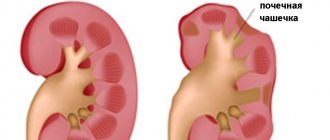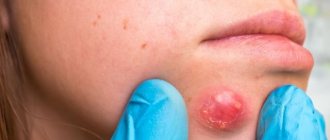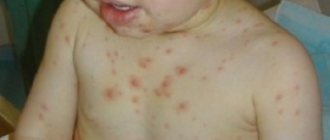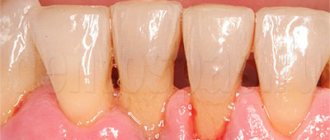The tongue is an indicator of the health of the whole organism. In an adult healthy person, the tongue is pale pink with well-defined papillae. A small amount of whitish coating on the tongue is normal and not a cause for concern.
The coating on the tongue may vary depending on the time of year. In summer, in hot weather, with a lack of fluid and dry mouth, the plaque becomes denser, acquiring a yellowish tint. Soft temporary deposits on the tongue are not a symptom of the disease, do not cause discomfort to the patient, clean well and disappear quickly.
But if the plaque persists, is poorly separated from the mucous membrane of the tongue, and bad breath appears - all these are signs of the development of pathological processes that require consultation with a doctor.
Yellow coating on the tongue: when not to worry
If a strange tint appears on your tongue, do not immediately sound the alarm. The color of the plaque may vary depending on the time of year. For example, in summer in hot weather with a lack of water, the plaque may have a yellowish tint, in winter it can be white-yellow. Do not forget about coloring foods (citruses, apricots, coffee, strong tea), bad habits and medications - they can also cause yellow plaque.
Such plaque can usually be quickly removed with a toothbrush or scraper. If it is impossible to get rid of it with the help of hygiene products, and in addition there is an unpleasant odor from your mouth, then it’s time to see a doctor.
Secondary symptoms
- layer thickness. If the natural color of the tongue is not visible through the plaque, we are dealing with severe processes or chronic diseases. A thin layer, on the contrary, indicates an initial stage or a slight deviation from the norm;
- coverage area (fully or partially);
- consistency. It can be thick, soft, dry or flaky;
- ease of removal. Dense thick plaque is usually difficult to remove. A softer, thinner layer is easier to clean, but can quickly reappear.
Causes of yellow coating on the tongue
- Poor functioning of the gastrointestinal tract.
The most common reason for the appearance of an unpleasant plaque, which can indicate either a mild ailment or a serious illness. As a rule, the issue is resolved by correcting the diet, that is, switching to a more gentle regime and giving up fatty and fried foods.
If the plaque is dense and has an unpleasant odor, then the cause is diseases of the digestive system (pancreatitis, gastritis, ulcers).
- Diseases of the liver, gall bladder, kidneys.
Excessive consumption of fatty and fried foods impairs the flow of bile, which disrupts liver function. Characteristic signs of liver and gallbladder diseases are a yellow coating on the tongue and a metallic taste in the mouth.
- Reaction to antibiotics.
Some medications increase the load on the liver and digestive organs. Since antibiotics kill not only harmful but also beneficial bacteria, to prevent dysbiosis, fermented milk products, prebiotics and probiotics are added to therapy.
- Viral and respiratory diseases.
Yellow plaque can be a consequence of infectious (whooping cough, scarlet fever, etc.) and respiratory (sore throat, pharyngitis, etc.) diseases. During illness, immunity decreases, which is why bacteria settle in the oral cavity, including on the tongue.
Yellow tongue in children
Yellow spots on a child’s tongue indicate a gastrointestinal disease.
In children, disruption of the gastrointestinal tract may also be accompanied by yellow spots on the tongue.
Symptoms of the disease also include painful abdominal cramps, nausea, the child’s reluctance to eat, constipation or, conversely, diarrhea.
Eating excessive amounts of food and consuming fatty foods overloads the digestive system of children, so after several hours of overeating, the child begins to feel a dry mouth, feels nauseous, and the tongue becomes covered with a layer of yellow plaque.
- Just like in adults, infections accompanied by fever also affect the condition of the tongue.
- Sudden changes in body temperature, vomiting and stool disturbances are a source of plaque with a brownish tint due to drying out of the mucous membrane and cracking of the tongue, which is accompanied by microbleeding.
- In case of poisoning, the tongue becomes coated due to increased load on the liver. In such situations, plaque is affected by water deficiency in the body.
- In infantile jaundice, the tongue may also turn yellow. This also applies to such types of jaundice as yellowing of the integument due to hepatitis.
- Lesions of the mucous membrane due to inflammatory processes in the mouth, such as stomatitis, carious tooth decay, give rise to pigmentation of the tongue.
- Kidney failure, diabetes mellitus, and disorders of the immune system disrupt metabolism, thereby promoting the accumulation of waste and toxins, which causes the tongue to become yellow.
Yellow coating on the tongue: how to treat
Treatment of pathology should begin with clarification of the diagnosis. To do this, you need to consult a therapist and specialists, take the necessary tests and undergo appropriate diagnostics. Treatment may include not only taking medications, but also a special diet, rinsing with medicinal solutions, careful oral hygiene, etc.
To prevent the formation of a yellow coating on the tongue, experts recommend not to overuse coffee, fried and spicy foods, and to include more vegetables and fruits.
How to remove plaque stains from the tongue
First, you need to carefully observe the rules of oral hygiene. Often, vigorous movements of the toothbrush are enough to remove the layer of plaque, after which it can disappear forever.
If after a few days your tongue remains clean and pink, then you don’t have to worry about this anymore, remembering to also clean your tongue while brushing your teeth.
An alarming sign may be the reappearance of plaque a few hours after cleansing. Then you need to seriously think about your health and what exactly triggered its appearance. Qualified help is needed otherwise the situation will get worse. It is necessary to observe the condition of your tongue for some time, and adhere to the following:
- In the morning and evening, carry out thorough oral hygiene, removing the layer of plaque, without overusing brushes with too hard bristles.
- Balance your diet, focusing on cottage cheese dishes and drinks with a high content of lactobacteria. Remove all junk food from your diet.
- You can use dietary supplements to stimulate the liver and improve the flow of bile. If the intensity of plaque on the tongue begins to fall, it means that the improvement in the quality of nutrition has had its effect; try to adhere to this lifestyle for a month.
- For respiratory diseases and anginal lesions, doctors recommend lubricating the tongue with emollient oils, such as peach. Thoroughly rinsing your mouth with tea leaves can also be effective. Rosehip extract can significantly improve the condition.
- If the reason is a disruption of the intestines, cleansing enemas and laxatives will help cope with the plaque, so you will get rid of accumulations of toxins. At the same time, it is also necessary to follow the principles of proper nutrition. However, it is better not to abuse these remedies and still resort to professional medical help.
Treatment
Sometimes it happens that there seem to be no health problems, and plaque bothers you quite often. For this case, there are quite a few folk remedies. First of all, you need to accustom yourself to brushing your teeth and tongue after every meal, and if this is not possible, then you should at least rinse your mouth with clean water or a special balm-rinse. At home, you can rinse your mouth with decoctions of medicinal herbs such as calendula, chamomile or sage.
Propolis, honey and other bee products will help cure plaque on the tongue. They are excellent natural antiseptics, and since plaque is a bacterial substance, the antiseptic properties of propolis will be more useful than ever. For rinsing, you should use an alcohol tincture of propolis, a few drops of which should be dissolved in a glass of water.
And here is another recipe for how to get rid of plaque: if it is not possible to rinse your mouth after eating, you can simply chew a piece of propolis. It will not only clean the surface of the tongue, gums and teeth from food debris, but will also have an antiseptic effect on the oral cavity. True, this method is only suitable for those who are not allergic to bee products.
A good way to remove plaque from the tongue is to eat vegetables and fruits. On the one hand, solid pieces of vegetables and fruits mechanically clean the tongue, teeth and gums. On the other hand, their consumption improves the digestion process and helps eliminate the cause of plaque.
Reasons for appearance
The healthy tongue of a physically healthy person should ideally be soft, soft pink, without cracks, abrasions or pimples. Sometimes there may be a slight grayish or brown coating on it, which is easily removed during hygiene procedures. If there is a thick layer of plaque on the tongue that cannot be removed by normal hygiene procedures, you should pay close attention to this. Most often, plaque on the tongue is formed due to digestive disorders:
- stomach diseases;
- gastritis;
- constipation;
- cholecystitis.
In the presence of these diseases, the patient develops a thick coating of white, gray or yellow color. Sometimes plaque is the first sign of a disease. In this case, the patient is interested in how to clean his tongue, but it turns out that he has serious diseases, without treatment of which it will not be possible to get rid of plaque. Therefore, the correct answer to the question: “I have a coating on my tongue, what should I do?” It would be advisable to consult a doctor and undergo a full examination for the presence of diseases of the gastrointestinal tract.
Causes
The reasons why a brown plaque has formed can be very diverse, ranging from eating foods with coloring properties to the presence of serious chronic diseases. Most often, a brown tongue signals diseases of the digestive system. Moreover, the more intense the color, the more complex and serious the disease.
However, diseases of the gastrointestinal tract are by no means the only reason why there is a brown coating on the tongue.
In the morning after sleep
A brown, white-brown or yellow-brown coating on the tongue in the morning after sleep is a sign of problems in the functioning of the human body. Normally, a white transparent coating may be present in the morning, which can be easily removed with a toothbrush and toothpaste. Sometimes even light brown plaque in the morning is normal if it is easily removed and does not appear again after brushing your teeth. But if in the morning it has an intense color, it is difficult to remove, and some time after cleaning it appears again, you should pay attention to the condition of the bronchopulmonary system (located at the tip of the tongue) or the gastrointestinal tract (closer to the root).
Smoking
A brown coating on the tongue and smoking are, at first glance, incompatible things. However, this is only at first glance. In fact, it is quite common for smokers to have dark spots on their tongue and teeth. The thing is that the resins that make up cigarettes have coloring properties and over time paint not only the tips of the fingers, but also the teeth and even the tongue of the smoker a dark color.
Tea and coffee
Drinking large amounts of hot chocolate, as well as dark chocolate bars, can cause your tongue to turn dark. In this case, a brown coating forms on the tongue and teeth, which is easily removed by brushing.
A brown coating on the tongue from tea may appear if you drink too much strong tea in large quantities. In this case, as with the formation of chocolate deposits, the stains are easily removed after hygiene procedures. Coffee can also cause a brown coating on the tongue, which can be easily removed with a toothbrush and toothpaste. Let us hasten to reassure everyone: such a plaque is not a sign of a disease and does not require special treatment. It may be advised not to overuse excessively strong tea and coffee, limit chocolate consumption, and also more thoroughly clean your teeth, gums and tongue using a toothbrush, toothpaste and special rinses.
Antibiotics and medications
The use of certain medications can also cause a patient to have a brown or dark brown tongue. For example, intense coloring is caused by the use of a drug such as faringosept (used for sore throats and other throat diseases). Plaque occurs after some antibiotics.
Malavit can also cause a brown tongue. There are a number of other drugs that have the same effect; usually the possibility of the formation of a brown coating is indicated in the instructions. In this case, after stopping the drug, side effects also disappear. By the way, a yellow-brown or white-brown coating on the tongue that has formed as a result of taking medications usually does not require discontinuation of the medications themselves or correction of treatment.
Fungal diseases of the oral cavity
Another fairly common reason why a brown coating forms on the tongue is the presence of fungal diseases of the oral cavity in the patient. With mycosis of the mucous membranes of the oral cavity, a white coating that is difficult to remove appears at an early stage. If treatment is not started in a timely manner, it begins to darken. In advanced cases, a focal yellowish-brown plaque forms on the patient, which is usually located in the center of the tongue. In this case, you should immediately consult a doctor and immediately start taking the prescribed medications.
Dysbacteriosis and food poisoning
A brown coating on the tongue, bitterness in the mouth, constipation or diarrhea, especially if accompanied by abdominal pain, usually indicate food poisoning or intestinal dysbiosis. In this case, folk remedies cannot be used; you should immediately consult a doctor to determine the diagnosis and prescribe appropriate treatment. Note that the root cause of the formation should be treated and eliminated, that is, disturbances in the functioning of the digestive system. After recovery, the plaque on the tongue will go away on its own, without any special treatment.
Quite often, the delay in starting treatment is due to the fact that, having noticed a brown coating on his tongue, the patient does not know which doctor to contact. If plaque formation is accompanied by nausea, diarrhea, abdominal pain, or a feeling of bitterness in the mouth, you should consult a gastroenterologist, as these symptoms indicate disturbances in the functioning of the gastrointestinal tract.
If the cause of the formation of a brown coating on the tongue is unknown, you should consult a physician for a full examination, which will allow you to establish the correct diagnosis.
Stomatitis
A brown coating on the tongue in the morning may also indicate the development of stomatitis. In this case, as in many previous ones, at the early stage of the disease a white coating forms, which covers the mucous membranes of the mouth, and when removed causes pain. Usually, already at this stage, the patient consults a doctor and begins taking medications, so the symptoms of the disease stop developing. But if suddenly, for some reason, the patient does not seek help in a timely manner, the plaque gradually turns from white to brown, indicating the progression of the process. In this case, treatment should be started as quickly as possible.
Dehydration
If a patient has a brown tongue, the causes of this condition may lie in dehydration. Typically, long-term severe disorders and disruptions in the gastrointestinal tract are accompanied by dehydration. In this case, it will not be enough to increase the amount of fluid you drink; more competent treatment is necessary, including the use of medications under the supervision of an experienced gastroenterologist.
In this case, the thicker and darker the plaque, the more difficult the patient’s condition. If during treatment the thickness and intensity of the color decreases, then the treatment is successful. If, on the contrary, the thickness of the plaque increases and its color becomes darker, it means that the treatment is ineffective and it needs to be corrected.
B vitamin deficiency and other causes
A brown tongue is a sign of such serious diseases as pellagra, lack of vitamin B, diabetic coma, Addison's disease and some others. In this case, only an experienced doctor can establish the correct diagnosis, based on laboratory tests.
A lack of B vitamins causes not only the appearance of dark brown or black plaque, but also the formation of painful cracks. If you do not start taking the necessary medications in a timely manner, your tongue will later become bright red and as if varnished.
Treatment of adults and children
To completely eliminate the film formed as a result of the disease, it is necessary to start with treating the root cause and eliminating bad habits. Otherwise, auxiliary methods will not have an effect, and the plaque will reappear later.
The treatment methods are basically similar: the doctor makes an accurate diagnosis and prescribes a course of medication.
The only difference is its duration and the activity of the medications taken. They try to prescribe gentle remedies for children that will not harm their health.
While taking medications, you need to monitor whether the color and density of plaque changes. If no changes are noticed, you should inform your doctor so that the patient’s course can be adjusted.
Differentiation of plaque in gastritis from other diseases of the gastrointestinal tract
A thick, grayish coating is characteristic of dysentery.
It is important to suspect the onset of a dangerous disease in time. To take action and prevent complications from occurring. Differential diagnosis by tongue of gastritis from other diseases and conditions:
- A thick, grayish coating is characteristic of dysentery. In this case, the tongue looks cracked, and less saliva is produced than usual.
- Desquamative glossitis - this type of inflammation of the tongue is characterized by such symptoms as red spots of complete absence of epithelium or several altered taste buds on the tongue, covered with a white coating.
- Galvanic stomatitis is a form of inflammation of the tongue that arises as a result of a reaction to metal prostheses, manifested by spots in the form of pimples, and subsequently by the appearance of erosions against a background of white plaque.
- Infectious diseases - sore throat, scarlet fever, diphtheria, HIV infection can cause the appearance of a white coating on the tongue, but almost all of these infections are accompanied by high fever and skin rashes.
- Diseases of the heart and blood vessels - plaque is located on the anterior third of the tongue.
- Kidney disease - plaque on the tongue is localized at the back along the edges.
- Endocrine disorders - under the plaques of white plaque there are ulcers and erosions.
- Anemia is not a coating on the tongue, but blanching of the entire surface of the organ. Diseases of the respiratory system are often indicated by the localization of white plaque on the front and along the edges of the tongue.
- Diseases of the salivary glands - the appearance of a white coating is accompanied by the appearance of an unpleasant odor.
- Diseases of the liver and gall bladder - the color of the plaque is not white, but has a yellowish or brown tint. A white coating on the tongue can be caused by the consumption of dairy products, as well as the proliferation of bacteria and fungi in those who abuse sweets. Unlike plaque during gastritis, such layers are easily removed and do not form further.







